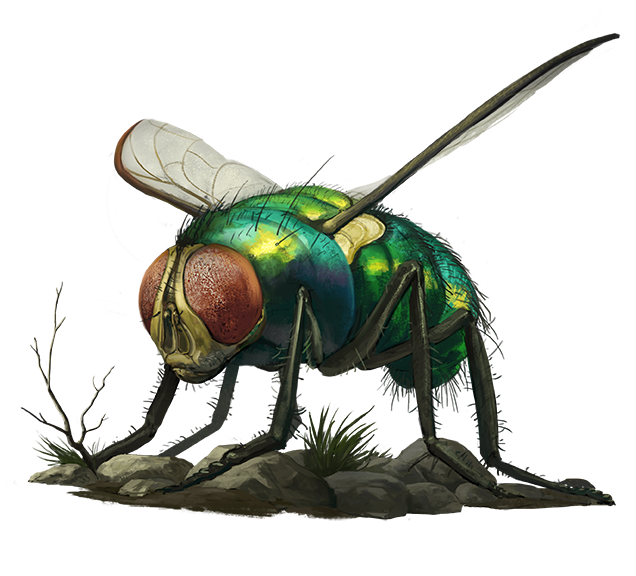

Art Credits
The Druid's Call - @aliceduke
Snowy Owlbear - Secret Lair x Wizards of the Coast Giant Fly - Pathfinder 2e, Archives of Nethys
Way of the Emerald Shifters
A Monastic Tradition for Monks
Among the organisation of nature worshippers known as the Emerald Enclave, magical guardians such as druids and rangers were the predominant caretakers of the world, but the vast tracts of land necessitated others who were less magically-inclined, but no less protective of the verdant natural world.
A particular clade of warriors, the Emerald Shifters, were those most skilled warriors who could feel the ebb and flow of life and could be taught to channel it into the ancient art of wildshaping by powerful Moon Druids, so that they could better patrol, observe and defend the primal lands they so cherished.
Druidic Training
You know Druidic, the secret language of druids. You can speak the language and use it to leave hidden messages. You and others who know this language automatically spot such a message. Others spot the message's presence with a successful DC 15 Wisdom (Perception) check but can't decipher it without magic.
Additionally, you learn the druidcraft cantrip, and can cast animal friendship once before completing a short or long rest, using Wisdom as your spellcasting ability.
Primal Shape
Starting at 3rd level, you can spend 1 ki point as a bonus action to magically assume a primal shape, a form based on a creature of the untamed wilds. You learn three CR 0 primal shapes and 1 each of CR 1/8, CR 1/4, CR 1/2 and CR 1 when you gain this feature, and you learn one new primal shape each time you gain a monk level. When you learn a primal shape, it must be one from the list of primal shape options at the end of this subclass, and the maximum CR of the chosen option can be no greater than your current monk level divided by three.
You can stay in a primal shape for 10 minutes, and you then revert to your normal form unless you use this feature again while transformed. You can revert to your normal form earlier by using a bonus action on your turn. You can renew the duration of your existing primal form, or change from one primal shape form to another, by spending a ki point as a bonus action while you are transformed. You automatically revert to your normal form if you fall unconscious, drop to 0 hit points, or die.
When you spend a ki point using this feature, you gain temporary hit points according to the size of the primal shape you transform into (or maintain the form of) as shown in the table below.
| Primal Shape Size | Temporary Hit Points Gained |
|---|---|
| Tiny | None |
| Small | Half of your monk level |
| Medium | Your monk level |
| Large | Twice your monk level |
While you are transformed, the following rules apply:
- Your game statistics are replaced by the statistics of the primal shape, but you retain your alignment, personality, current and maximum hit points, and Intelligence, Wisdom, and Charisma scores. You also retain all of your skill and saving throw proficiencies, in addition to gaining those of the primal shape.
- You cannot take any Multiattack action your primal shape form possesses.
- Any attacks you make with unarmed strikes or natural weapons while in a primal shape form are treated as attacks made using monk weapons.
- You can't cast spells, and your ability to speak or take any action that requires hands is limited to the capabilities of your primal shape form. Transforming doesn't break your concentration on a spell you've already cast, however, or prevent you from taking actions that are part of a spell, such as call lightning, that you've already cast.
- You retain the benefit of any features from your class, race, or other source and can use them if the new form is physically capable of doing so. However, you can't use any of your special senses, such as darkvision, unless your new form also has that sense.
- You choose whether your equipment falls to the ground in your space, merges into your new form, or is worn by it. Worn equipment functions as normal, but the DM decides whether it is practical for the new form to wear a piece of equipment, based on the creature's shape and size. Your equipment doesn't change size or shape to match the new form, and any equipment that the new form can't wear must either fall to the ground or merge with it. Equipment that merges with the form has no effect until you leave the form.
Primal Enhancement
Beginning at 7th level, you add half of your proficiency bonus to your AC, saving throws, attack rolls and as extra damage on any attack you successfully hit with while in a primal shape form.
Reflexive Shift
Beginning at 7th level, as a reaction when a spell or weapon attack is made against you, after knowing whether it would hit you or not, you can transform into a primal shape form you know that is a smaller size category than your current size category. If you do, then increase your AC against that attack by 2 for each size category smaller your new form is than the form the attack was made against, potentially causing that attack to miss. You retain that new form until the end of your next turn, at which point you revert to the form you were in when you used this feature.
Stable Form
Beginning at 11th level, you have advantage on saves against Transmutation spells, and Transmutation spell attacks have disadvantage to hit you. If your shape is changed against your will, such as by a polymorph spell or a medusa's petrifying gaze, you may use an action to end the effect and return to normal. You may do so even if the effect would normally prevent you from taking actions, such as being petrified.
Greater Primal Shape
At 11th level, when you transform into a primal shape form, you can spend 1 additional ki point to choose one of the following options to gain as a trait while in that primal shape form.
Regeneration. For ten minutes, or until you end your primal shape and revert to your normal form (whichever is shorter), you regain one hit point at the start of each of your turns. After 5 minutes, any severed body members (fingers, legs, tails, and so on) are restored. If you have the severed part and hold it to the stump, this effect instantaneously causes the limb to knit to the stump.
Titan Size. For ten minutes, or until you end your primal shape and revert to your normal form (whichever is shorter), your size doubles in all dimensions and your weight is multiplied by eight. This growth increases your size by one category for the duration, but does not increase the amount of temporary hit points you gain from your primal shape transformation. While enlarged, you have advantage on Strength checks and Strength saving throws, your reach increases by 5ft, and your unarmed strikes and natural weapons deal one additional weapon die of damage.
Emerald Avatar
At 17th level, you attain the pinnacle of your shapeshifting capabilities. When you roll for initiative, you can immediately use your Primal Shape feature without spending a ki point.
Additionally, once, you can spend 5 ki points to cast true polymorph, but you can only target yourself. You regain your use of this feature after completing a long rest.


















Primal Form Options
All primal form options that can be learned by a Way of the Emerald Shifters monk (except Fly, shown below) are freely available as part of the Basic Rules, so no source books are required.
Challenge Rating 0
- Baboon
- Bat
- Cat
- Crab
- Deer
- Eagle
- Fly*
- Frog
- Jackal
- Lizard
- Octopus
- Owl
- Quipper
- Rat
- Raven
- Scorpion
- Spider
Challenge Rating 1/8
- Camel
- Flying Snake
- Giant Crab
- Giant Rat
- Mastiff
- Mule
- Poisonous Snake
- Stirge
- Twig Blight
Challenge Rating 1/4
- Axe Beak
- Blink Dog
- Boar
- Constrictor Snake
- Draft Horse
- Elk
- Giant Badger
- Giant Bat
- Giant Centipede
- Giant Frog
- Giant Lizard
- Giant Wolf Spider
- Panther
- Pseudodragon
- Pteranodon
- Riding Horse
- Violet Fungus
- Wolf
Challenge Rating 1/2
- Ape
- Black Bear
- Cockatrice
- Crocodile
- Giant Goat
- Giant Seahorse
- Giant Wasp
- Reef Shark
- Warhorse
- Worg
Challenge Rating 1
- Brown Bear
- Death Dog
- Dire Wolf
- Giant Eagle
- Giant Hyena
- Giant Octopus
- Giant Spider
- Giant Toad
- Hippogriff
- Lion
- Tiger
Challenge Rating 2
- Allosaurus
- Ankheg
- Awakened Tree
- Ettercap
- Giant Boar
- Giant Constrictor Snake
- Giant Elk
- Grick
- Griffon
- Hunter Shark
- Pegasus
- Plesiosaurus
- Polar Bear
- Rhinoceros
- Saber-Toothed Tiger
Challenge Rating 3
- Anklyosaurus
- Giant Scorpion
- Killer Whale
- Manticore
- Minotaur
- Owlbear
- Phase Spider
- Yeti
Challenge Rating 4
- Elephant
Challenge Rating 5
- Bulette
- Giant Crocodile
- Giant Shark
- Roper
- Triceratops
Challenge Rating 6
- Chimera
- Mammoth
- Wyvern
Fly
Tiny Beast, Unaligned
- Armor Class 12 AC
- Hit Points 1 (1d4-1)
- Speed 5ft., fly 20ft. (hover)
STR DEX CON INT WIS CHA 1 (-5) 14 (+2) 8 (-1) 1 (-5) 10 (+0) 1 (-5)
- Skills Perception +2
- Senses Passive Perception 12
- Languages --
- Challenge 0 (10 XP) Proficiency Bonus +2
- Keen Smell. The fly has advantage on Wisdom (Perception) checks that rely on smell.
- Spider Climb. The fly can climb difficult surfaces, including upside down on ceilings, without needing to make an ability check.
